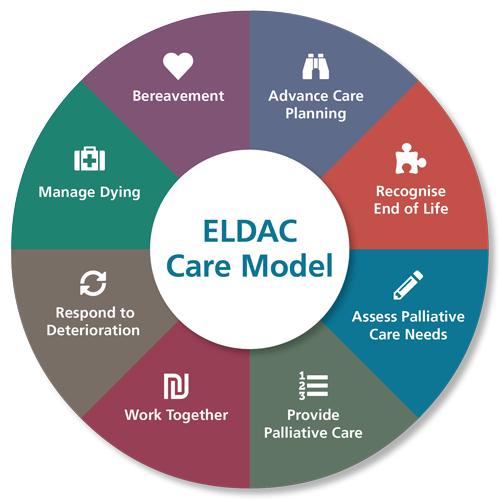ACCPA National Conference: Insights and challenges in aged care palliative practices
A blog post by Dr Priyanka Vandersman, Senior Research Fellow, ELDAC
The biggest aged care event of Australia, the ACCPA National Conference, was held in Adelaide in the last week of October. The ELDAC team had a significant presence at this conference with an exhibition booth and ELDAC Flinders Lead Professor Jennifer Tieman featured as part of a panel discussing palliative and end of life care in aged care.
It was a great opportunity to engage with the sector in a meaningful way and to discuss how ELDAC can add value in supporting the sector in end of life care and palliative care. We also used the opportunity of this conference to ask a few questions to the delegates around their end of life and palliative care needs and their current practices.
We received just under 50 responses to our survey, over 50% of whom were service/care managers or nurses. Respondents represented diverse settings with a majority situated in the Residential Aged Care space [60%] followed by 21% from Home Care. Respondents lived and practiced across various geographic locations with 67% based in metropolitan areas, 19% in rural, and 18% in regional centres.
The first survey question intended to understand the sector’s familiarity with ELDAC. We found out that 70% of the respondents had engaged with ELDAC in the past, with the most common way of engagement being the use of ELDAC website [60%], followed by ELDAC Toolkits [40%]. Notably, 36% used more than one ELDAC service. We were also keen to understand types of activities the services are currently engaged in, to support palliative care practices. Respondents indicated educational initiatives to upskill staff and collaboration with projects such as ELDAC to be the top two approaches to support palliative care. Many respondents also noted policy and processes to support care at the end of life such as policy/procedure reviews, updated referral pathways, multidisciplinary engagements, and emotional support as a core part of care. Finally, the last question aimed to discover which areas of support were needed in palliative and end of life care within the aged care s ector.
ector.
We used the eight domains of the ELDAC Care Model as a guide to help respondents pick the ONE element of crucial need. Interestingly, over 40% of respondents noted more than one element of the ELDAC Care Model as areas of crucial need. Advance Care Planning ranked highest at 51%, followed by Working Together [44.7%] and Recognising End of Life [38.3%].
The survey results offer valuable insights into current practices and challenges in providing palliative care in aged care. These findings will be a crucial resource for guiding future initiatives of ELDAC, with a focus on supporting the aged care sector in delivering high-quality palliative care to older individuals at the end of their lives.

Dr Priyanka Vandersman
Senior Research Fellow, ELDAC